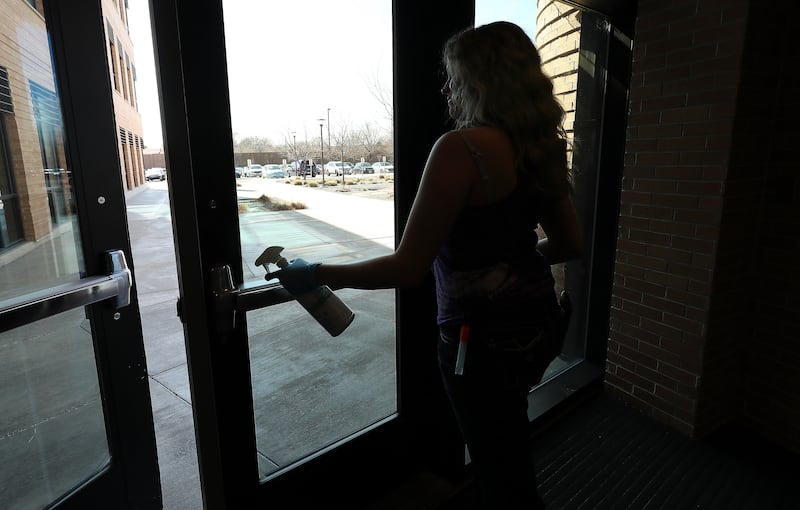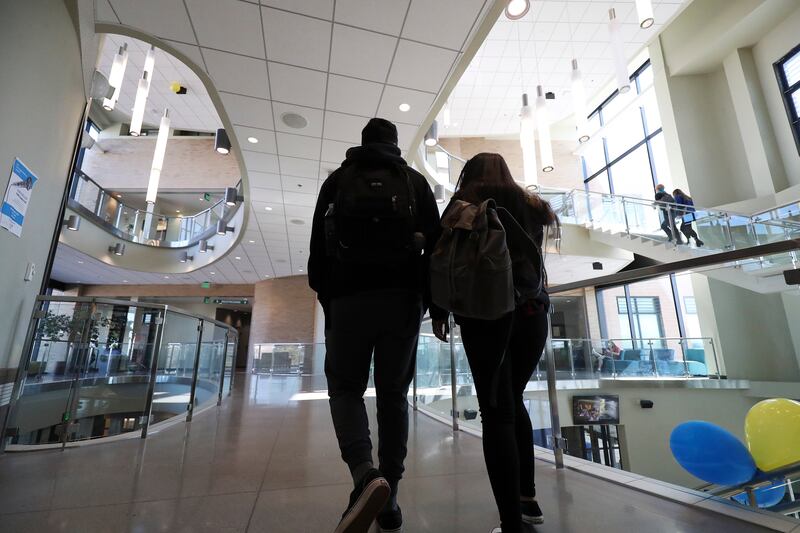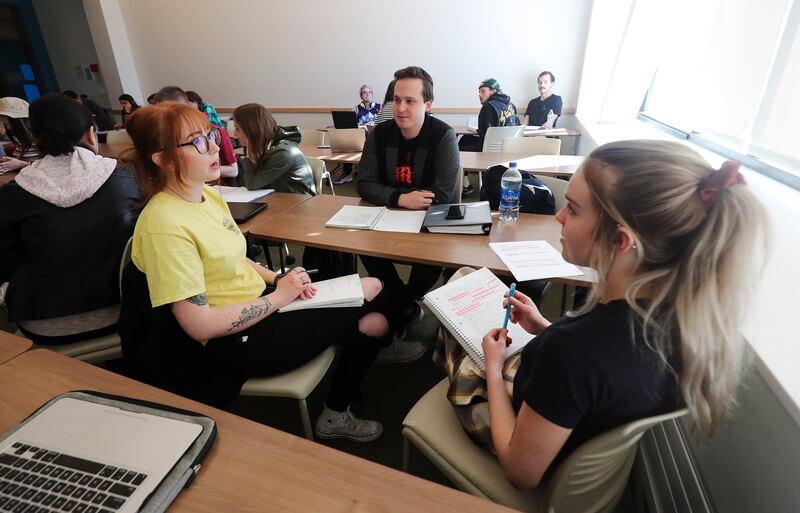SALT LAKE CITY — At Salt Lake Community College, the COVID-19 outbreak is adding new dimensions to Claire Peterson’s role as an assistant professor of humanities.
She’s prepared to shift to online instruction for the remainder of spring semester if it becomes necessary due to the novel coronavirus outbreak.
“We as faculty who are teaching in person, we utilize a learning platform called Canvas. I feel confident because we’re all conversant in that and utilize it already with our in-person classes,” she said. Faculty can use the platform to set up discussion boards, conduct live lectures and otherwise communicate with their students.
“It’s very accessible, very familiar to students,” she said.
In addition to her teaching responsibilities, Peterson oversees about 25 adjunct and concurrent faculty, and she said she is confident each of them would be able to utilize Canvas to continue teaching their students, too.
“Obviously, there would be other disruptions, but in terms of content delivery, and I think it would be minimal because we’re already utilizing Canvas as a really effective learning platform already,” she said.
While SLCC faculty are well aware about the coronavirus outbreak, “I don’t feel like anyone is overly, majorly concerned,” Peterson said.

The college has kept students, staff and faculty well-informed and the college supports faculty who need to take sick time. Peterson said she and other faculty encourage students who are ill not to come to class.
“So I think that we’re in an environment that’s supportive and so I don’t see a great deal of panic. I probably see more hand washing than normal,” she said.
The college has even pasted stickers in restrooms to encourage thorough hand washing, but that’s the only obvious change, Peterson said.

Across Utah, colleges and universities are closely monitoring public health reports and readying contingency plans in the event classes must shift to online instruction or other forms of distance learning.
The University of Utah’s latest COVID-19 advisory says the university is not cancelling on-campus classes but it is reviewing the feasibility of moving large enrollment classes to online formats in place of in-person instruction.
To that end, the university has developed a Canvas “fast course” to activate online class environments and to embed lectures and class announcements. Canvas enables professors to post grades, information and assignments online. It is widely used nationwide.
“Please encourage your faculty to consider new methods of teaching this semester to limit potential exposure in our classrooms,” the advisory states.
Elsewhere in the country, college campuses have been temporarily closed or they have shifted to online instruction for the remainder of the spring term.
Harvard University told its students on Tuesday not to return to campus after spring break and to expect to complete classwork remotely until further notice.
Meanwhile, 33 Southern Utah University students and three faculty who were in Italy taking part in the university’s Jumpstart program have safely returned to the United States, said university spokesman David Bishop.
“We were very fortunate to have made that decision prior to things really blowing up in Italy,” Bishop said. The timing was such that the university was able help arrange for the group’s return before the Italian government decided to send all international students home in the face of rapid spread of COVID-19.
“We had already made the call and got the wheels rolling to get our students out of Italy and then back home so it all worked out, fortunately,” he said.
Jumpstart is a one-year program where students can earn all their general education requirements. The group was originally scheduled to return from Italy in April.
None of the students or faculty had planned to spend the semester on the Cedar City campus and they have returned to their homes. Students will complete their work online, he said. Thus far, none have exhibited any symptoms of COVID-19, he said.
For students on SUU’s campus, in-person classes are continuing as usual, with both students and staff looking forward to spring break next week, Bishop said. Otherwise, faculty are preparing to shift to online instruction if it becomes necessary.
“If something were to happen and we were forced to close the university, we are fully confident that we would be able to fulfill our core mission, which is teaching students. ... Our system is fully capable of teaching classes online,” he said.
Otherwise, the campus conducts daily planning meetings as its members hope “it’s just a great exercise and we don’t really have to put the plan in motion,” Bishop said.
At BYU, the university is communicating with its community via the university website.
If traditional classrooms cannot be used, BYU can utilize Zoom for online video conferencing of lectures and other academic meetings. The faculty is also encouraged to use Canvas or Learning Suite, which would allow students to take online exams and upload assignments online, according to the website.
At SLCC, the COVID-19 outbreak has presented a unique opportunity for faculty to discuss the issue in the classroom and fold it into the curriculum, Peterson said.
One topic of discussion in Peterson’s classroom has been the items people purchase in times of crisis.
For instance, as the Y2K neared, many people bought duct tape and plastic sheeting.
“I was like, ‘What are people going to do with it?’” Peterson said.
Now, stores are selling out of toilet paper, even though COVID-19 presents as respiratory illness caused by a viral infection not a stomach bug, she said.
“It’s actually been a good opportunity to discuss patterns and how we react to things and in the context of humanities. Why do we react to this one thing, but we don’t react to this other thing over here?” she said.
Hopefully, by making current events relevant to students it will “help them process some of the worries or fear that they may have. In terms of that, it’s sort of reminding them to double-check where they’re getting their information,” Peterson said.
Peterson said it has helped that the college has worked to keep students, faculty and staff in the loop with its communications.
SLCC college has chosen to be “vigilant but not bombard people with every little detail moving forward,” SLCC spokesman Joy Tlou said.
Tlou, who has a long tenure with the college, said he recalls when the college successfully navigated through outbreaks of H1N1; severe acute respiratory syndrome (SARS); and Middle East respiratory syndrome (MERS).
“The discussions that we’re having now ... are echoes of those same conversations that we’ve had in the past,” Tlou said.
As the college continues to refine its contingency plans, it is operating as normally as possible, he said.
“We’re just a college that cares about its community so that’s the approach that we’re taking,” he said.


